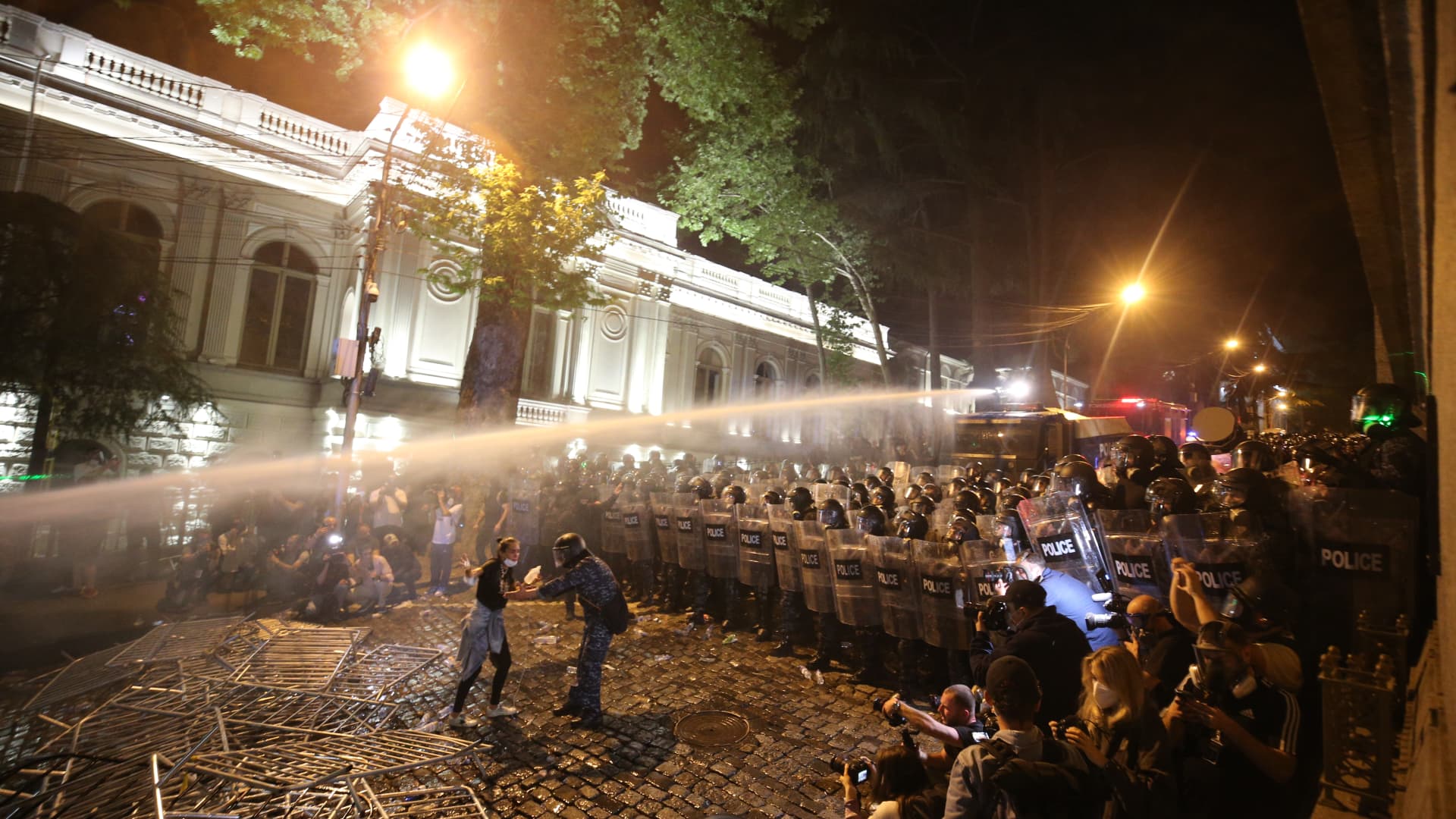Police use tear gas, water cannons and stun grenades on ‘foreign agent’ bill protesters in Georgia’s capital

Protestors clash with the police as they block the exists of the parliament building to prevent the ruling Georgian Dream Party’s deputies from leaving within a protest against the bill on ‘Transparency of Foreign Influence,’ in Tbilisi, Georgia on April 30, 2024. (Photo by Davit Kachkachishvili/Anadolu via Getty Images)
Davit Kachkachishvili | Anadolu | Getty Images
Tear gas, stun grenades and water cannons were reportedly used by riot police against protesters in Georgia’s capital Tbilisi as demonstrations over a so-called “foreign agent” bill escalated.
Clashes lasted until late into Tuesday night, with police trying to disperse protesters which the Georgian internal ministry said were breaking demonstration laws by blocking entrances and exits to the country’s parliament. Sixty-three people were arrested, the ministry said.
“Totally unwarranted, unprovoked and out of proportion use of force ongoing in Tbilisi against peaceful protesters,” Georgia’s President Salome Zourabichvili said in a post on social media platform X.
The bill would force non-governmental organizations, campaign groups and media platforms who receive at least 20% of funding from abroad to register as “foreign agents.” They would also be under close scrutiny by Georgia’s justice ministry and be made to share sensitive details with authorities, or be faced with large fines.
Law enforcement officers detain a protester during a rally against a controversial “foreign influence” bill, which Brussels warns would undermine Georgia’s European aspirations, near the parliament in Tbilisi on April 30, 2024.
Giorgi Arjevanidze | Afp | Getty Images
Police use tear gas to disperse protesters near the Georgian parliament during a rally against a controversial “foreign influence” bill, which Brussels warns would undermine Georgia’s European aspirations, in Tbilisi on April 30, 2024.
Giorgi Arjevanidze | Afp | Getty Images
Demonstrators face law enforcement officers during a rally against a controversial “foreign influence” bill, which Brussels warns would undermine Georgia’s European aspirations, in Tbilisi on April 30, 2024.
Giorgi Arjevanidze | Afp | Getty Images
The ruling Georgia Dream party proposed the bill, and members of parliament gave their initial sign off earlier this month. Another vote is expected on Wednesday.
Georgia’s Prime Minister Irakli Kobakhidze has accused NGOs of trying to launch revolutions and spread propaganda in the country, while Georgia Dream’s founder Bidzina Ivanishvili on Monday said foreign funding for NGOs was a way to strengthen intelligence agencies, Reuters reported. They argue that the bill would boost transparency.
The bill’s opponents, including Georgia’s President Zourabichvili, say it would obstruct media freedom, and push the country away from the European Union and closer to Russia.
Georgia became an EU candidate country in late 2023, however member countries voted not to begin accession talks while the “foreign agent” bill is under consideration. The U.S. has also been critical, with the state department saying it was “incredibly troubling” and “akin to the kinds of legislation that we see in the Kremlin.”
European Union foreign policy chief Josep Borrell on Wednesday said using force to suppress the right to assemble peacefully is “unacceptable.”
“I strongly condemn the violence against protesters in Georgia who were peacefully demonstrating against the law on foreign influence. Georgia is an EU candidate country, I call on its authorities to ensure the right to peaceful assembly. Use of force to suppress it is unacceptable,” he said in a post on X.









